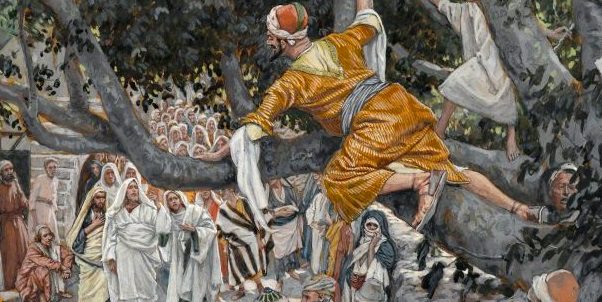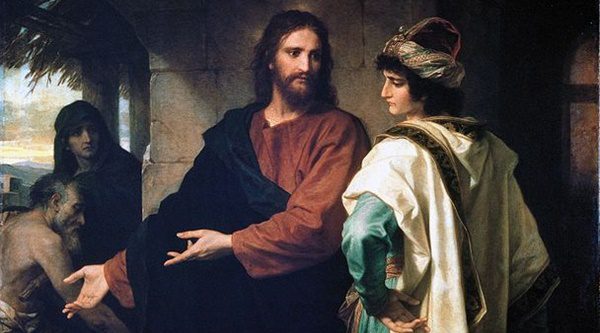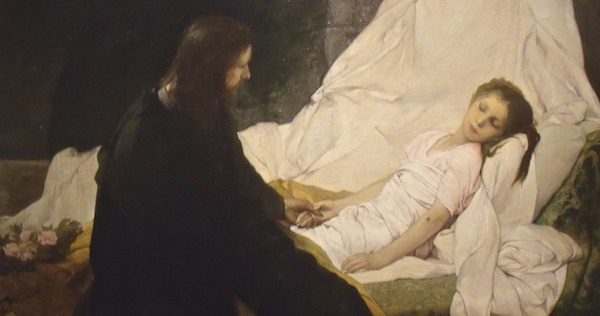 Pastors have a frequent question when they begin to discover mimetic theory. “That’s great. But how does it preach?”
Pastors have a frequent question when they begin to discover mimetic theory. “That’s great. But how does it preach?”
Reverend Tom Truby shows that mimetic theory is a powerful tool that enables pastors to preach the Gospel in a way that is meaningful and refreshing to the modern world. Each Wednesday, Teaching Nonviolent Atonement will highlight his sermon as an example of preaching the Gospel through mimetic theory.
In this sermon, Tom explores the story of Zacchaeus, who climbed a tree to get a better view of Jesus. As he saw Jesus better, Zacchaeus encountered salvation by discovering that “God loves us all and doesn’t construct enemy lists; that’s all our doing and only shows how lost we are. But the good news is that the Human One came to seek and save the lost and the lost include us all.”
Year C, 24th Sunday after Pentecost, Proper 26
October 30th, 2016
Thomas L. Truby
Luke 19:1-10
Cataract Distortions
Zacchaeus was a chief administrator of a whole cadre of hated collaborators with the enemy. They collected the money that was then used to oppress them by a brutal and unstoppable army of foreigners. Zacchaeus’s wealth was skimmed off the earning of the other tax collectors who were in direct connection to the people. He would be like a Wall Street banker living several stories above the people on the street.
The irony is that while living above them all, in normal life he dwelt below them, being a short man. When he was among them he could see nothing and lost all perspective.
Being curious about Jesus, what he looked like, how many people followed him and how he related to the different folks around him, he climbed a tree so that he could observe. He must have been a very good observer of relationships to have risen as so far. He wanted to see for himself, make his own assessment and not depend on the reports from people around him. His social isolation had already giving him a perspective different from the crowds. In other words he wanted to see the patterns of relations Jesus stimulated as he moved through the village. Who did Jesus notice and who did he ignore? Who were drawn to him and who recoiled in his presence? How much fear dulled the eyes of those who looked upon him and did he elicit fear in how he presented himself.
Not wanting people to know he planned to observe Jesus from the cover of a tree, he ran ahead of the crowd and crawled up. He was like a deer hunter in a shelter observing but not himself being seen. Maybe he didn’t want people to know he was curious about Jesus. People in his position were supposed to have it made. Their hearts weren’t supposed to ache from loneliness and lack of connection.
“When Jesus came to that spot, he looked up and said, ‘Zacchaeus, come down at once.’” We have reached the dramatic apex to today’s story. Zacchaeus, a man used to giving orders, and a man whose orders had dramatic impact on others’ lives, is told to immediately come down. Is he about to be redressed by someone with more authority than he? Will he be fired or shamed? As a tax collector he knows he doesn’t occupy the moral high ground. His heart must have plummeted to the pit of his stomach as he looked into the commanding eyes of the person below him.
And then Jesus offered his next sentence. The one that reversed the negative spin the tax collector’s guilty conscience had set in motion. “I must stay in your home today!” Jesus said. He is not about to shame him, Jesus wants to come to his home and visit him! What could this mean? The chief tax collector knows everyone hates him and yet Jesus wants to come to his home.
Jesus is taking a position different from everyone in this political parade. Intense political crowds are fickle and Jesus’ actions had just exposed Jesus to a shift in their mood. They could all turn against them and stone both Jesus and the man in the tree. Jesus is risking his life for this tax collector and Zacchaeus knows it.
Jesus’ actions in going against the crowd must have impacted the observant Zacchaeus. Deciding it’s safe to leave his tree shelter and place himself in the trust of Jesus, he comes down.
“Everyone who saw this grumbled, saying, “He has gone to be the guest of a sinner.’” Notice, everyone who saw this grumbled. There was not a one who did not. All were in agreement that Jesus was doing a bad thing. Somehow Jesus was able to counter every single person there and act in a way contrary to all their wishes. I find this absolutely amazing. I don’t know how he was able to do it. It was an act in anticipation of what he will again do in Jerusalem. And in Jerusalem it will cost him his life.
In their minds Jesus was a man of God and therefore pure. In their minds Zacchaeus had collaborated with their enemy and therefore was impure—a sinner. Sinners were to be separate from God, God hated sinners; how could Jesus go his house. It was a scandal, an outrage, a betrayal of God and a betrayal of all they had built their lives on. They could make no sense of it and so they grumbled.
I suspect most in that crowd, if not all, decided there and then that Jesus was not their man. They would not be voting for him anytime soon. Whereas before they had been enthusiastic or undecided, now they knew what they would do. His actions had showed them he did not know the God of Abraham.
And then something strange happened that thrust them back into muddled thought. “Zacchaeus stopped and said to the Lord, ‘Look, Lord, I give half of my possessions to the poor. And if I have cheated anyone, I will repay them four times as much.’” Zacchaeus had changed! They had not thought of that. They had written him off and excluded him from their community. But now he was demonstrating behavior totally outside their frame of reference. In fact, they had been secure in their “goodness” because they had been secure in his “badness.” But now Zacchaeus was doing good things. It messed with their world. It was very unsettling. While Jesus’ going to Zacchaeus’ house may have been good news for Zacchaeus, it wasn’t necessarily good news for them. It threw their world up for grabs.
To make sure that everyone who saw this and grumbled couldn’t go back and invent some spin that changed what had happened into its opposite, Jesus planted a fiery torch in their way that could not be removed. “Today, salvation has come to this household for he too is a Son of Abraham,” he said. If the crowd wanted to be Jesus’ followers, they would have to stretch themselves to include this person they had considered unclean. They would have to include this person they had thought of as their enemy. And it was more than just Zacchaeus; their love would have to include all those they had always thought of as enemies—even the collaborators with Rome, even those who had become very rich due to their collaboration. It was a tall order. Living in love and forgiveness is not easy.
I think of Standing Rock in North Dakota in reference to this. Do we consider our Native American brothers and sisters our enemies? Do we indulge in fantasies of revenge on the riot police charged with removing them? If we are followers of Jesus our perspective must embrace them both. Perhaps naming violence itself as the problem delineates the path.
Then Jesus added one more sentence that shook the world. He said, “The Human One came to seek and save the lost.” The Human One gives us the measure and model for what being a human looks like. Anything short of Jesus is a distortion and we all have distorted vision. Even Paul looked through a glass darkly. All of us have cataract-induced distortions. The more we allow Jesus to form us, the clearer we will see for he is the Human One.
“The Human One came to seek and save the lost.” We thought it was Zacchaeus and his sort that was lost and they are, but now we discover that we are lost too. Not lost and subject to eternal damnation but lost in our distorted relationships with each other and therefore lost in our connection with God. God loves us all and doesn’t construct enemy lists; that’s all our doing and only shows how lost we are. But the good news is that the Human One came to seek and save the lost and the lost include us all. He came to show us we are all included. Amen.
Image: James Tissot [No restrictions or Public domain], via Wikimedia Commons











